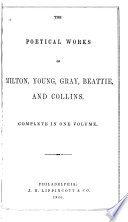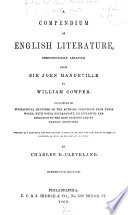 | John Milton - English poetry - 1860 - 574 pages
...hear our song. But, O the heavy change, now thou art gone, Now thou art gone, and never must return 1 Thee, shepherd, thee the woods, and desert caves With...soft lays, As killing as the canker to the rose, Or taint-worm to the weanling herds that graze, Or frost to flowers that their gay wardrobe wear, When... | |
 | Charles Dexter Cleveland - English literature - 1860 - 766 pages
...long; 35 And old DamoBtas loved to hear our song. But, 0, the heavy change, now thou art gone, Now thou art gone, and never must return ! Thee, Shepherd,...caves. With wild thyme and the gadding vine o'ergrown, 40 And all their echoes mourn : The willows, and hazel copses green, Shall now no more be seen, Fanning... | |
 | Charles Dexter Cleveland - English literature - 1860 - 778 pages
...long; 35 And old Damcetas loved to hear our song. But, O, the heavy change, now thou art gone, Now thou art gone, and never must return ! Thee, Shepherd,...desert caves, With wild thyme and the gadding vine o ergrown, 40 And all their echoes mourn : The willows, and hazel copses green, Shall now no more be... | |
 | Francis Turner Palgrave - English poetry - 1861 - 356 pages
...ditties were not mute, Temper'd to the oaten flute ; But, O the heavy change, now thou art gone, Now thou art gone, and never must return ! Thee, Shepherd,...lays : — As killing as the canker to the rose, Or taint-worm to the weanling herds that graze, Or frost to flowers, that their gay wardrobe wear When... | |
 | Louis Lohr Martz - Poetry - 1986 - 388 pages
...wilde Thyme and the gadding Vine o'regrown, And all their echoes mourn. The Willows, and the Hazle Copses green, Shall now no more be seen, Fanning their joyous Leaves to thy soft layes. As killing as the Canker to the Rose, Or Taint-worm to the weanling Herds that graze, Or Frost... | |
 | Meyer Howard Abrams - Literary Criticism - 1989 - 452 pages
...presents a three-line passage from Milton's Lycidas which describes one consequence of Lycidas's death: The willows and the hazel copses green Shall now no...seen. Fanning their joyous leaves to thy soft lays. Although, he tells us, it is "merely a coincidence" when a perceptual closure coincides with a formal... | |
 | Reynolds Price - Family & Relationships - 1995 - 372 pages
...ancient shepherd named Lycidas and longed for in this piercing extravagant cry with its keening vowels. "Thee shepherd, thee the woods, and desert caves,...soft lays. As killing as the canker to the rose, Or taint-worm to the weanling herds that graze, Or frost to flowers, that their gay wardrobe wear, When... | |
 | James Russell Kincaid - Literary Criticism - 1995 - 288 pages
...never must return!" (1. 38) — and then by transferring the mourning activity from himself to nature: "Thee Shepherd, thee the Woods, and desert Caves,/...gadding Vine o'ergrown,/ And all their echoes mourn" (11. 39-41). The blight is on nature, associated with the speaker only through the remote figure of... | |
 | Cleanth Brooks - Literary Criticism - 1995 - 364 pages
...in a process of starts and stops. Thus, in reading the following lines from Milton's "Lycidas" — The Willows and the Hazel Copses green Shall now no...seen, Fanning their joyous Leaves to thy soft lays — Fish says that the reader is constrained to stop at "seen," so that he interprets the passage to... | |
 | Carl R. Woodring, James Shapiro - Literary Criticism - 1995 - 936 pages
...hear our song. But O the heavy change, now thou art gone, Now thou art gone, and never must retum! Thee shepherd, thee the woods, and desert caves. With wild thyme and the gadding vine o'ergrown, 40 And all their echoes moum. The willows and the hazel copses green Shall now no more be seen. Fanning... | |
| |